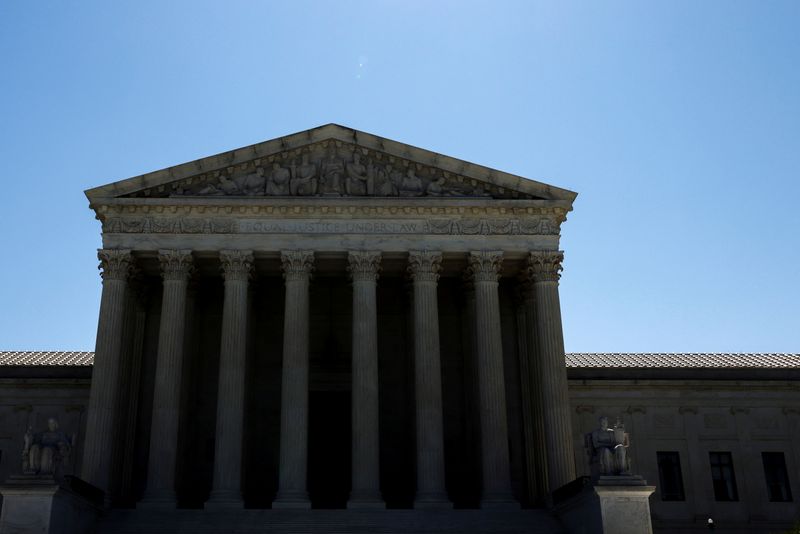By Andrew Chung
(Reuters) -The U.S. Supreme Court on Monday allowed a U.S. Patent and Trademark Office tribunal that has gained a reputation for canceling patents to continue operating, but reined in the power of its in-house judges.
The justices, in a 5-4 ruling authored by conservative Chief Justice John Roberts, upheld a 2019 lower court decision that the judges on the Patent Trial and Appeal Board were appointed in a way that violates a U.S. Constitution provision intended to ensure accountability for powerful government officials.
The U.S. government had appealed the lower court ruling in a legal challenge pursued by privately held Florida-based medical device company Arthrex Inc.
The ruling indicates that the tribunal's current structure failed to provide for enough direct review of the patent judges - who have power to invalidate issued patents - by their superiors who are accountable to the U.S. president to satisfy constitutional requirements.
While the Supreme Court's majority found that the administrative patent judges were improperly appointed, a different majority of justices also concluded that the problem could be fixed under the Constitution by giving the Patent and Trademark Office's director the power to review decisions by the judges.
The Supreme Court took a different approach than the solution offered by the Washington-based U.S. Court of Appeals for the Federal Circuit, a specialized patent court, to remove certain job protections for the judges, giving their superiors more power to fire them at will.
Noting that billions of dollars can turn on a decision by the board, Roberts wrote, "What matters is that the director have the discretion to review decisions rendered by APJs (administrative patent judges). In this way, the president remains responsible for the exercise of executive power - and through him, the exercise of executive power remains accountable to the people."
The solution prescribed by the justices would allow the tribunal to continue to operate, though the Patent and Trademark Office has already said more than 100 cases will have to be reconsidered.
The board, an administrative court run by the Patent and Trademark Office, takes a second look at patents issued by the agency and often cancels them, much to the dismay of some inventors. The tribunal, created by Congress in 2011, adjudicates the validity of hundreds of patents annually and has invalidated more than 2,000 patents.
The tribunal's reviews have become a quick and cheap way for companies that are prime targets for infringement suits, such as such as Apple Inc (NASDAQ:AAPL) and Alphabet (NASDAQ:GOOGL) Inc's Google, to try to invalidate patents. Litigation before the tribunal is seen by many companies as a more efficient alternative to resolving cases in federal court.
Arthrex had challenged the constitutionality of the judges' appointments after the tribunal in 2018 invalidated part of the company's patent for a surgical device for re-attaching soft tissue to bone. British-based rival Smith & Nephew (LON:SN) PLC had requested the review of Arthrex's patent.
Monday's ruling rejected Arthrex's argument to hold the entire tribunal unconstitutional and said that the agency's director should now decide whether the dispute should be reheard.
At issue was whether the patent judges were appointed in violation of the Constitution's so-called appointments clause, which requires certain high government officials - known as "principal officers" - to be named by the president and confirmed by the U.S. Senate.
Other "inferior officers" with lesser authority may be appointed and supervised by department heads, who are themselves named by the president. A president can fire principal officers at will, but patent judges, as members of the civil service, possess certain job protections including from unrestricted removal.
The dissenting justices called the ruling unnecessary.
"Just who are these 'principal' officers that Congress unsuccessfully sought to smuggle into the executive branch without Senate confirmation? About 250 administrative patent judges who sit at the bottom of an organizational chart," wrote conservative Justice Clarence Thomas, joined by the court's three liberal justices.
